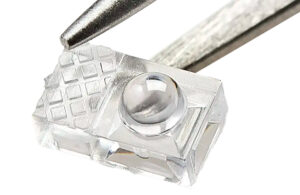
Isometric Micro Molding manufactures miniaturized parts and components for medical devices. [Photo courtesy of Isometric Micro Molding]
Nissha Medical Technologies today announced a definitive agreement to acquire Isometric Micro Molding.
Buffalo, New York–based Nissha Medical Technologies said it expects to close the deal by the end of 2023.
Nissha Medical Technologies (a subsidiary of Kyoto, Japan-based Nissha Co.) is a contract development and manufacturing organization (CDMO) focused on minimally invasive surgical instruments and wearable devices. Nissha will take a majority stake in Isometric Intermediate LLC., which owns the Isometric group of companies.
“This strategic agreement aligns seamlessly with our mission to deliver high-quality, value-added products in the global medical device market,” Nissha said in an announcement.
Isometric Micro Molding CEO Donna Bibber and President Wayne Shakal purchased the medtech supplier in 2021. New Richmond, Wisconsin–based Isometric is an ISO 13485 certified micro-molding service provider with “ultra-precise capabilities with microscopic polymer components and sub-assemblies” for sensors, transdermal patches, life science disposables, sheaths, anchors, capillaries, robotic surgery systems and neurovascular implants.
“Isometric’s proprietary tooling and process technologies for micro-molding have positioned them as trailblazers in achieving single micron tolerances,” Nissha said in the announcement. “Their micro-formed products have significantly contributed to the miniaturization of endoscopic and surgical devices, enhancing functionality and driving improved patient outcomes. With in-house expertise in tool making, molding process controls, advanced metrology, micro 3D printing, and micro-assembly automation platforms, Isometric has become a trusted solution provider in the design, development, and manufacturing of micro-formed parts.”
Nissha said the deal will build on its recent capital and business partnership with EndoTheia, which designs and develops endoscopic devices.
“Our combined strength is set to redefine the landscape of minimally invasive surgical instruments and surgical robotics,” Nissha said. “Together, we aim to meet the evolving needs of medical devices, enhancing component miniaturization and improving the maneuverability of small and precision components, ultimately contributing to improved medical efficiency.”